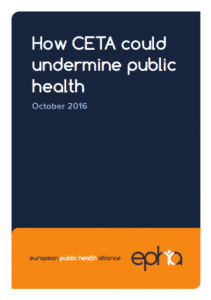
Can international trade deals ever be beneficial to public health?
We firmly believe that international trade deals can be beneficial to public health on the condition that negotiations establish appropriate regard to the public interest and set the right conditions to ensure protection and continuous improvement of public health and rights, and access to quality health services and affordable medicines. There is every reason to believe that reopening negotiations on the above mentioned aspects of the text would get a much better deal for Europe that would be capable of winning support, and set a genuinely progressive blueprint for future trade deals with other parts of the world. The European Public Health Alliance now calls on the European Parliament and national parliaments to protect public health by refusing to ratify the agreement and call for a better deal for health and consumers.
8 reasons why EPHA is calling for the rejection of CETA
While trade liberalisation initiated in CETA has the potential to support public health by supporting economic growth, higher incomes and greater employment opportunities, this can be undermined by the unintended side-effects of the trade deal. CETA is incoherent with key public health policy goals and does not contribute to the battle against the growing burden of Non-Communicable Diseases and obesity and does not contribute to universal access to affordable medicines.
- Revised investment protection measures will not stop tobacco, alcohol, unhealthy food companies and private investors in public services from challenging public health laws
- Tariff eliminations on unhealthy processed food and drinks and on agricultural products could contribute to the NCD and obesity epidemics
- CETA ignores the health risks linked to high meat consumption by making market access commitments
- CETA does not address the global challenge of Antimicrobial Resistance (AMR)
- CETA has the potential to undermine the quality standard and the affordability of Services of General Interest (social, healthcare, education, water)
- CETA does not address health sustainability and alcohol related harm
- CETA is not based on an assessment of its potential impacts on the price of medicines
- The joint interpretative declaration does not fix the health problems of CETA
What should be done? And who should do it?
EPHA calls on Members of Parliaments to reject the recently negotiated agreement between EU and Canada, known as a Comprehensive Economic and Trade Agreement (CETA), and in particular the Investor Protection Provisions (proposed Investment Court System-ICS).
The European Commission should undertake an urgent assessment of the potential impacts of removal of tariffs on health-harmful products on public health, so that national governments can make plans for mitigating measures and policies.
The European Commission should undertake an urgent assessment of the potential impacts on the price of medicines, as a result of closer regulatory cooperation with Canada – a country with the second highest per capita medicines spend in the world, second only to the USA.
The Court of Justice of the European Union (CJEU) should be requested to provide an Opinion on the legal compatibility with the ICS provisions with European Union law, before ratification, to avoid costly legal challenges with uncertain outcomes after entry into force.
Un résumé en français de la position de l’EPHA sur CETA ” Comment CETA pourrait nuire à la santé publique” est disponible ici (PDF)
Az EPHA ‘Hogyan lehet ártalmas a CETA a népegészségre‘ álláspontjának a magyar nyelvű összefoglalója itt olvasható (pdf)

